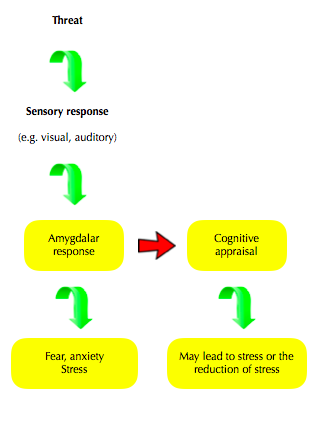Jamieson et al (2011)
 If you have seen the Ted Talk How to make stress your friend, then you have heard Kelly McGonigal discuss a study on how cognitive appraisal can affect your level of stress during a difficult public speaking task. The study she was describing is by Jamieson et al (2011).
If you have seen the Ted Talk How to make stress your friend, then you have heard Kelly McGonigal discuss a study on how cognitive appraisal can affect your level of stress during a difficult public speaking task. The study she was describing is by Jamieson et al (2011).
This study may be used to discuss a cognitive approach to one health problem - stress. It could also be used to discuss either research methods or ethical considerations in health psychology.
The Transactional Model of Stress argues that it is the interaction of cognitive and physiological responses that lead to how we experience stress. The theory argues that it is the cognitive appraisal of the environmental stressor that leads to an emotional response - or the lack thereof. The theory argues that cognition is a mediating factor in the stress response.
This model also has biological support. Remember that the stress response may begin when we see something that is threatening in some way to us. This information is then sent to the amygdala, which interprets the images and sounds. When it perceives danger, it instantly sends a distress signal to the hypothalamus. LeDoux (2007) argues that the intensity of fear, anxiety and the amygdalar response to stress maybe be mediated by cognition.

The study by Jamieson argues a biopsychosocial model of stress. It is argued that a stress response is a combination of the body's physiological response to an environmental threat, mediated by cognitive appraisal. Kelly McGonigal argues that when we see stress as a way to help us to deal with something, rather than something to be feared, then it has a less negative effect on our health.
Fifty participants (25 male, 25 female) were recruited from the Cambridge (Massachusetts) area. Any participants that had a history of heart problems or high levels of hypertension were excluded from the study.
To begin the study, a baseline cardiovascular recording was taken for all participants. Participants were then randomly assigned to one of three conditions:
- The reappraisal condition, where participants read a script about the benefits of reappraising arousal. They were asked to think about stress as adaptive.
- The ignore stress condition, where participants were read a script that said that the best way to overcome stress is to ignore the source of stress. They were asked to look at a large X placed over the evaluator on the left.
- The no-intervention condition, where participants were not asked to read anything but carried out a non-demanding task.
After reading the articles, they were asked questions to guarantee that they had read and understood the articles.
Participants then completed the Trier Social Stress Test while their cardiovascular responses were recorded. Some of the tasks included delivering a 5-minute videotaped speech in front of two evaluators. Throughout the speech, the evaluators provided negative feedback. Following the speech, participants performed an impromptu 5-min mental arithmetic task: Counting backward in steps of 7 from 996 while the evaluators again provided negative feedback.
In addition to collecting physiological data, participants were also asked to fill in a questionnaire to record their subjective level of stress.
The researchers found that participants instructed to think of their stress as helpful exhibited more positive cardiovascular stress responses - increased cardiac efficiency, and less significant increases blood pressure than either of the other two controls. Thus, cognitive reappraisal of stressful situations shows potential health benefits.
- The study was highly controlled and has high internal validity. The situation, however, may not be generalizable to all forms of stress. The stress in this study was acute, not chronic stress.
- The study was cross-sectional. It is not clear what the long-term effectiveness of such cognitive strategies would be.
- The participants were all mentally healthy individuals. Stress and anxiety is part of many disorders. It is not clear what effect such reappraisal would have on people with such disorders. However, this research could help provide a preventive strategy for anxiety and stress-related illnesses.

 IB Docs (2) Team
IB Docs (2) Team
